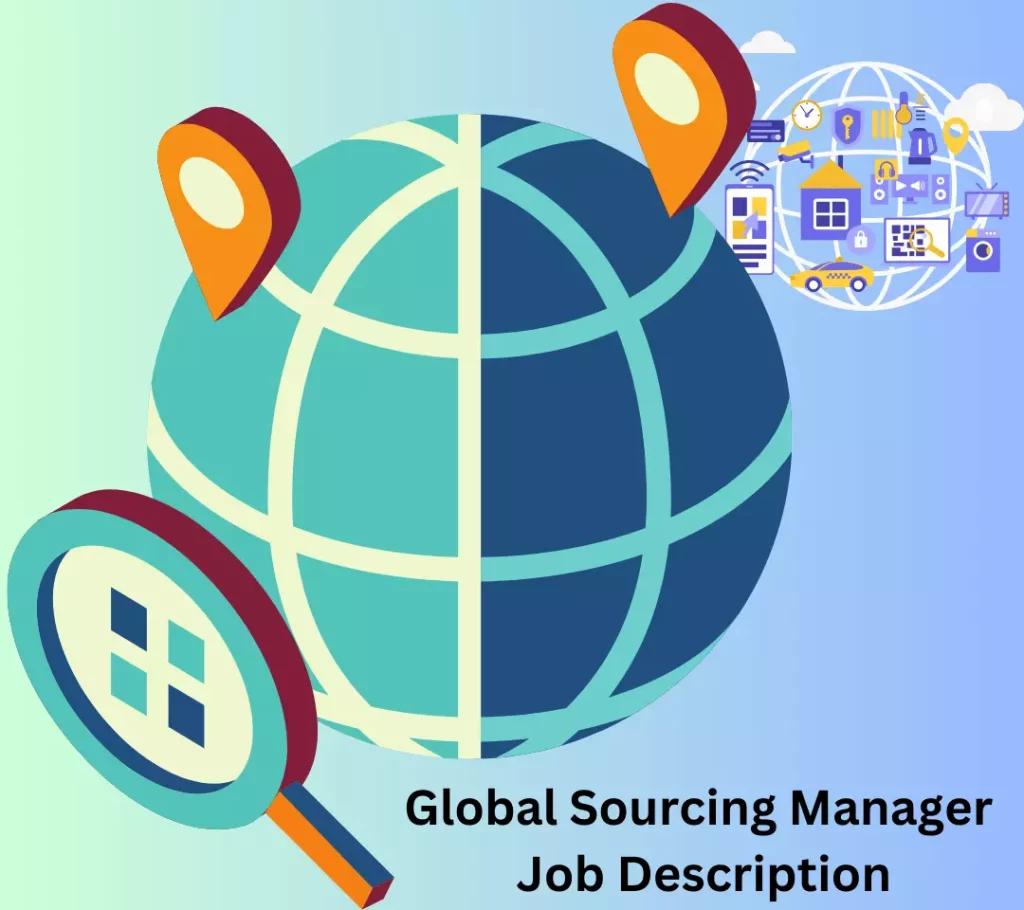As a Global Sourcing Manager, your primary responsibility will be to develop and implement sourcing strategies to ensure the timely and cost-effective procurement of goods and services on a global scale. You will be responsible for identifying and engaging with suppliers, negotiating contracts, managing supplier relationships, and optimizing the supply chain to meet the company’s sourcing goals and objectives. You will work closely with cross-functional teams to align sourcing strategies with business needs and drive continuous improvement in quality, cost, and delivery performance. This article is all about global sourcing manager job description.

Responsibilities of Global Sourcing Manager
The responsibilities of a Global Sourcing Manager can vary depending on the specific industry and organization they work for. However, in general, a Global Sourcing Manager is responsible for managing the procurement and sourcing activities of an organization on a global scale. Their main objective is to identify, evaluate, and select suppliers from around the world to ensure the organization’s supply chain is efficient, cost-effective, and reliable. Here are some common responsibilities of a Global Sourcing Manager:
1. Sourcing Strategy Development
As a Global Sourcing Manager, you will be responsible for developing and executing comprehensive sourcing strategies that align with the organization’s objectives. This includes identifying cost reduction opportunities, improving product quality, and optimizing the supply chain. By conducting thorough market research and analysis, you will identify potential suppliers and evaluate their capabilities. Additionally, you will assess market trends to support decision-making in terms of sourcing strategies.
2. Supplier Identification and Evaluation
In this role, you will be tasked with identifying and qualifying suppliers that meet the organization’s requirements. You will evaluate suppliers based on factors such as quality, capacity, pricing, and compliance. This involves conducting due diligence, including site visits, audits, and supplier performance evaluations, to ensure that supplier selection aligns with the company’s standards and expectations.
3. Negotiation and Contract Management
As a Global Sourcing Manager, you will take the lead in negotiating with suppliers to secure favorable terms and conditions. This includes negotiating pricing, payment terms, lead times, and quality standards. Additionally, you will be responsible for developing and managing supplier contracts, ensuring compliance, risk mitigation, and enforceability.
4. Supplier Relationship Management
Building and maintaining strong relationships with key suppliers is a crucial aspect of the role. You will foster collaboration, communication, and continuous improvement by actively engaging with suppliers. Monitoring supplier performance against established metrics, addressing any issues or concerns promptly, and driving supplier development initiatives are important tasks for maintaining productive and sustainable supplier relationships.
5. Supply Chain Optimization
Collaboration with internal stakeholders, such as operations, engineering, and quality teams, is essential for identifying opportunities to optimize the supply chain. This may involve cost reduction initiatives, lead time improvements, and risk mitigation strategies. Your role will be to implement these strategies and enhance supply chain visibility, flexibility, and responsiveness to changing market conditions.
6. Compliance and Risk Management
Ensuring compliance with applicable laws, regulations, and industry standards is crucial in sourcing and procurement activities. As a Global Sourcing Manager, you will be responsible for understanding and adhering to these regulations. Additionally, you will need to identify and mitigate potential risks related to supplier performance, market volatility, geopolitical factors, and other relevant factors to ensure a resilient and reliable supply chain.
7. Performance Measurement and Reporting
Establishing key performance indicators (KPIs) will help track and evaluate sourcing performance, supplier performance, and cost savings. As a Global Sourcing Manager, you will be responsible for defining these metrics and preparing regular reports and dashboards. By effectively communicating sourcing metrics, trends, and achievements to stakeholders, you will ensure transparency and enable data-driven decision-making.
Qualifications and Skills of Global Sourcing Manager
- A Bachelor’s degree in business administration, supply chain management, or a related field is typically required. Advanced degrees or professional certifications (e.g., CSCP, CPSM) are a plus and can demonstrate a higher level of expertise.
- Proven experience in strategic sourcing, procurement, or supply chain management is essential, preferably in a global or multinational organization. This experience showcases your ability to navigate complex sourcing challenges and adapt to diverse market conditions.
- Strong knowledge of sourcing principles, methodologies, and best practices is necessary to develop effective strategies and drive continuous improvement.
- Demonstrated ability to develop and execute sourcing strategies that drive cost savings, quality improvements, and supply chain optimization is crucial. This includes effectively leveraging market research, supplier evaluation, and negotiation skills.
- Excellent negotiation skills and experience in contract management are necessary to secure favorable terms and conditions with suppliers. Contract management expertise ensures that agreements are well-drafted, enforceable, and aligned with organizational objectives.
- A solid understanding of supply chain dynamics is important to identify and mitigate potential risks. This involves assessing factors such as supplier performance, market volatility, and geopolitical considerations to maintain a resilient supply chain.
- Proficiency in data analysis and the utilization of sourcing tools, systems, and software is advantageous. This enables you to leverage data-driven insights and make informed decisions in sourcing activities.
- Strong interpersonal and communication skills are crucial for building relationships and collaborating with internal stakeholders and suppliers. Effective communication ensures alignment of goals and expectations, facilitating productive partnerships.
- The ability to work in a fast-paced, global environment and manage multiple priorities effectively is essential. Global sourcing involves coordinating activities across different time zones, cultures, and geographies.
- Knowledge of relevant regulations, compliance standards, and ethical sourcing practices is important to ensure sourcing activities adhere to legal and ethical requirements. This includes understanding trade regulations, labor standards, and sustainability principles.
Note: The above job description is a general outline of responsibilities and qualifications typically associated with the Global Sourcing Manager role. Actual job duties may vary depending on the organization’s specific needs and industry.



